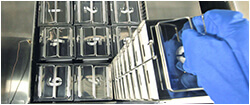Polymerase Chain Reaction (PCR) and Enzyme-Linked Immunosorbent Assay (ELISA) are two widely used techniques in molecular biology and immunology, respectively. Here are reasons why PCR and ELISA testing are employed:
PCR (Polymerase Chain Reaction)
DNA Amplification
PCR is used to amplify specific DNA sequences. It allows researchers to generate millions to billions of copies of a target DNA region, making it easier to analyze, sequence, or manipulate the DNA.
Genetic Testing and Diagnostics
PCR is extensively used in genetic testing and diagnostics. It enables the detection of genetic mutations, polymorphisms, and the presence of specific genes associated with diseases.
Molecular Cloning
PCR is an essential tool in molecular cloning. Amplified DNA fragments can be easily inserted into plasmids or other vectors for further manipulation and expression in various organisms.
Pathogen Detection
PCR is employed for the detection of pathogens, including bacteria, viruses, and fungi. It allows for the specific identification of microbial DNA, aiding in the diagnosis of infectious diseases.
Forensic DNA Analysis
PCR is widely used in forensic science for the analysis of DNA evidence. It enables the amplification of small or degraded DNA samples, facilitating the identification of individuals.
Gene Expression Analysis
Real-time PCR (qPCR) is used to quantify the expression levels of genes. It provides insights into the regulation of gene expression and is valuable in gene expression studies and diagnostics.
Mutation Detection
PCR is employed to detect specific mutations in DNA sequences. This is crucial for understanding genetic diseases, assessing the risk of inherited conditions, and guiding personalized medicine approaches.
Environmental DNA Analysis
PCR is used to analyze environmental DNA (eDNA), allowing for the detection of species-specific DNA in environmental samples. This is useful in biodiversity studies and ecological monitoring.

BioStorage
See why we’re San Diego’s leading storage provider for the biopharma and device industries.
ELISA (Enzyme-Linked Immunosorbent Assay)
Antigen Detection
ELISA is commonly used for the detection of specific antigens, such as proteins or peptides. This is valuable in diagnosing infectious diseases, autoimmune disorders, and cancer.
Antibody Detection
ELISA is employed to detect antibodies in biological samples. It is used in serological testing to identify the presence of antibodies against specific pathogens or antigens.
Quantitative Protein Detection
ELISA can be used for quantitative measurement of proteins in a sample. This is important in research, diagnostics, and pharmaceutical development for assessing protein levels.
Disease Diagnosis
ELISA is widely used in clinical laboratories for diagnosing various diseases, including infectious diseases, autoimmune disorders, and allergies.
Drug Detection
ELISA is used for drug testing in clinical and forensic settings. It allows for the detection of drugs or their metabolites in biological samples such as urine or blood.
Monitoring Immune Responses
ELISA is used to assess immune responses by measuring the levels of cytokines, antibodies, or other immune-related molecules. This is important in immunology research and vaccine development.
Food and Environmental Testing
ELISA is employed for testing food and environmental samples for the presence of contaminants, allergens, or toxins. It is widely used in quality control and safety assessments.
Hormone Assays
ELISA is used for the quantification of hormones in biological samples. This is crucial in endocrinology research and clinical diagnostics.

About Sequence Sciences
Find out why we’re San Diego’s leading storage provider for the biopharma industry.
